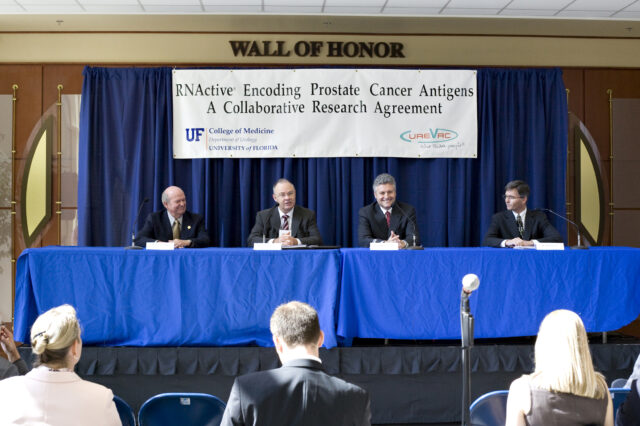UF scientists to work with German firm in prostate cancer treatment research

University of Florida College of Medicine officials signed an agreement Tuesday to collaborate with the German biopharmaceutical company CureVac to test an experimental therapy for advanced prostate cancer patients who no longer respond to traditional treatment.
CureVac — which specializes in the therapeutic application of messenger RNA, a biomolecule that transfers genetic information from nuclear DNA to cellular protein production machinery — is developing a stabilized mRNA-derived vaccine for treatment of prostate cancer.
UF urology researchers will conduct a phase 1/2 clinical trial of the therapy in patients from the United States with metastatic prostate cancer who no longer respond to hormone therapy. Both institutions hope the initial collaboration will result in a better biologic product to work with in the second phase of the clinical trial.
"The agreement with the University of Florida represents our first step to the U.S. as the world's leading pharmaceutical marketplace with world-class academic institutions for research and development," said Thomas Lander, M.D., managing director and chief medical officer of CureVac.
In what will be the first direct-application trial of its kind in the United States, researchers plan to test molecules that have shown the potential to stimulate an immune response against tumors when injected into the skin, potentially providing an alternative therapy for this form of cancer.
"Several studies support the therapeutic potential of mRNA for the treatment of cancer," said Johannes Vieweg, M.D., a professor and chairman of UF's department of urology who is a member of CureVac's scientific advisory board. "This, however, will be the first clinical trial in the U.S. to use the direct application route by injecting modified mRNA into the skin."
UF urology researchers have treated more than 500 patients using RNA-based dendritic cells, which have been used in vaccines to treat the cancer, but these cells are difficult to manufacture and are often limited in quantity. Researchers hope to discover whether CureVac's technology may be an equivalent or more effective therapy to stimulate tumor response, Vieweg said.
"Our extensive experience and expertise in immunological monitoring and vaccine development are of value to companies such as CureVac, I believe, making us an attractive partner to work with," Vieweg said.
The Prostate Cancer Foundation estimates nearly 200,000 men will be diagnosed with prostate cancer in the United States in 2008. Treatment options generally include surgery or radiation if patients are diagnosed at an early stage. Hormone therapy is often used when cancer has spread beyond the prostate gland.
The proposed clinical trial is expected to begin in 2009. In the first phase of the trial, researchers will seek to define the optimal dose level of the therapy, as well as establish safety and evaluate improvements needed for the regimen. A European clinical trial is also planned.
University of Florida department of urology officials and CureVac, a German-based biopharmaceutical company, signed a collaboration agreement June 17 to advance research in prostate cancer vaccine therapy at a signing ceremony at the UF Cancer & Genetics Research Complex. From left, Peter Pevonka, senior associate dean for research affairs at the UF College of Medicine, Dr. Thomas Lander, managing director and chief medical officer of CureVac, Dr. Johannes Vieweg, professor and chairman and Wayne and Marti Huizenga eminent scholar of the department of urology at the UF College of Medicine, and Dr. Michael Good, interim dean of the UF College of Medicine. (Photo by: Sarah Kiewel/University of Florida)